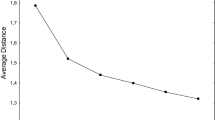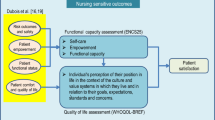Abstract
The aim of this study was to carry out a theoretically-based survey of elderly persons’ perceptions of quality of care, in terms of their evaluations of actual care conditions, as well as the subjective importance they ascribe to these. The sample consisted of 428 elderly (≥ 60 years) persons, in four different care environments: a geriatric department (N=51); persons receiving home nursing (N=111); nursing homes (N=111); and service homes (N=154) in two Swedish cities. Data were collected by way of personal interviews, structured from the questionnaire, Quality from the Patients’ Perspective (QPP). The QPP is theory- based and consists of 40 items covering 17 factors. Each item was evaluated in two ways by the respondent: assessment of perceived reality, and evaluation of subjective importance (Likert scales). The results show that personal characteristics, such as age, sex, and self- rated health, had a limited effect on reports of what were regarded as highly important care characteristics, as well as on ratings of actual care conditions. Psychological well- being was strongly related to perceived reality ratings; a favorable well-being covaried with favorable ratings and vice versa. Considerable differences were noted in both types of ratings when the four types of care environments were compared. On the subjective importance scales, persons living in service homes reported lower scores, particularly on the scales designed to measure the medical- technical competence of the caregivers. On the perceived reality scales, the participants in service homes and the geriatric department scored lower. Thus, different types of care environments may be connected with different kinds of expectations and needs, which through selective perception and socialization processes, may be strengthened during a person’s stay in a particular care environment. In contrast to previous studies, highest scores on subjective importance were noted on the scales designed to measure care equipment and care room characteristics; this could be due to the fact that physical- technical conditions often have a direct impact on the daily lives of elderly people. (Aging Clin. Exp. Res. 7: 140–149, 1995)
Similar content being viewed by others
References
Eurolink Age: A right of residence for elderly people in the European Community. COM (89) J: 275 final-SYN-200-1989.
World Health Organization: Small area planning for elderly. By Muriel Skeet. World Health Organization, Report EUR/ICP/HEE No. 225, 1989.
Calnan M.: Towards a conceptual framework of lay evaluation of health care. Soc. Sci. Med. 27: 927–933, 1988.
Clearly P.D., McNeal B.J.: Patients satisfaction as an indicator of quality of care. Inquiry 25: 25–36, 1988.
Davies A.R, Ware J.E.: Involving consumers in quality of care assessment. Health Affairs 7: 33–48, 1988.
World Health Organization: Quality assurance of health services. World Health Organization, Regional Committee for Europe, Thirtyeight session, Copenhagen, 12–17 September, 1988.
Vuori H.: Patient satisfaction — Does it matter? Qual. Assur. Health Care 3: 183–189, 1991.
Hall J.A., Feldstein M.D., Fretwell M., Rowe J.W., Epstein A.M.: Older patients’ health status and satisfaction with medical care in an HMO population. Med. Care 28: 261–270, 1990.
Hall J.A., Dornan M.C.: Patient sociodemographic characteristics as predictors of satisfaction with medical care: A meta-analysis. Soc. Sci. Med. 30: 811–818, 1990.
Linn L.S., Greenfield S.: Patient suffering and patient satisfaction among the chronically ill. Med. Care 20: 425–431, 1982.
Samuelsson G., Edebalk P-G., Ingvad B.: Quality attributes of Swedish home-help services — from a consumer perspective. Z Gerontol. 26: 202–207, 1993.
La Monica E.L., Oberst M.T., Madea A.R., Wolf R.M.: Development of a patient satisfaction scale. Res. Nurs. Health 9: 43–50, 1986.
Hall J.A., Dornan M.C.: What patients like about their medical care and how often they are asked: A meta-analysis of satisfaction literature. Soc. Sci. Med. 27: 935–939, 1988a.
Hall A., Dornan M.: Meta-analysis of satisfaction with medical care: Description of research domain and analysis of overall satisfaction levels. Soc. Sci. Med. 27: 637–644, 1988b.
Meterko M., Nelson E.C., Rubin H.R.: Patient judgements of hospital quality. Report of a pilot study. Med. Care (Suppl.) 28: 1–56, 1990.
Rubin H.R., Ware J.E., Hayes R.D.: The PJHQ Questionnaire: Exploratory factor analysis and empirical scale constructions. In: Meterko M., Nelson E.C., Rubin H.R. (Eds.), Patient yudgements of hospital quality. Report of a pilot study. Med. Care (Suppl.) 28: 22-29, 1990.
Thompson A.G.H.: The soft approach to quality of hospital care. Health Care Man. 10–14: 59–67, 1986.
Blair G., Sparger G., Walts L., Thompson J.: Primary nursing in emergency department: nurse and patient satisfaction. J. Emerg. Nurs. 8: 181–186, 1982.
Linder-Pelz S.: Toward a theory of patient satisfaction. Soc. Sci. Med. 16: 577–582, 1982a.
Linder-Pelz S.: Social psychological determinants of patient satisfaction: A test of five hypotheses. Soc. Sci. Med. 16: 583–589, 1982b.
Parasuraman A., Zeitham V.A., Berry L.L.: A conceptual model of service quality and its implications for research. J. Mark. 49: 41–50, 1985.
Risser N.L.: Development of an instrument to measure patient satisfaction with nurses and nursing care in primary care settings. Nurs. Res. 24: 45–52, 1975.
Tse D.K., Wilton P.C.: Models of consumer satisfaction formation: An extension. J. Mark. Res. 25: 204–212, 1988.
Samuelsson G., Ingvad B., Edebalk P.G.: A method of ranking different quality attributes in home help services — In a consumer perspective “Multiattribute Utility Technology”. B. Rapport VII: 4. Gerontologiskt Centrum, Lund, Sweden, 1993.
Wilde B., Starrin B., Larsson G., Larsson M.: Patients’ view on quality of care: A grounded theory study. Scand. J. Caring Sci. 7: 113–120, 1993.
Wilde B., Larsson G., Larsson M., Starrin B.: Quality of care: Development of a Patient-Centred Questionnaire based on a Grounded Theory Model. Scand. J. Caring Sci. 8: 39–48, 1994.
Marshall V.: Physician characteristics and relations with older patients. In: Hauged M. (Ed.), Elderly patients and their doctors. Springer, New York, 1981.
Hall J.A., Milburn M.A., Epstein A.M.: A causal model of health status and satisfaction with medical care. Med. Care 31: 84–93, 1993.
LeVois M., Nguyen T.D., Attkinsson C.: Artifact in client satisfaction assessment. Eval. Prog. Plan. 4: 139–150, 1981.
Costa P.T., McCrae R.R.: Neuroticism, somatic complaints and disease: Is the bark worse than the bite? J. Personal. 55: 299–313, 1987.
Golant S.M.: Individual differences underlying the dwelling satisfaction of the elderly. J. Soc. Iss. 38: 121–133, 1982.
Watson D., Pennebaker W.: Health complaints, stress and distress: Exploring the central role of negative affectivity. Psychol. Rev. 87: 34–154, 1989.
Cryns A.G., Nichols R.G., Katz L.A., Calkins E.: The hierarchical structure of geriatric patient satisfaction: An older patient satisfaction scale designed for HMOs. Med. Care 27: 802–816, 1989.
Phifer J.F., Murrell S.A.: Etiologic factors in the onset of depressive symptoms in older adults. J. Abnormal Psych. 95: 282–291, 1986.
Author information
Authors and Affiliations
Rights and permissions
About this article
Cite this article
Wilde, B., Larsson, G., Larsson, M. et al. Quality of care from the elderly person’s perspective: Subjective importance and perceived reality. Aging Clin Exp Res 7, 140–149 (1995). https://doi.org/10.1007/BF03324304
Received:
Revised:
Accepted:
Published:
Issue Date:
DOI: https://doi.org/10.1007/BF03324304




